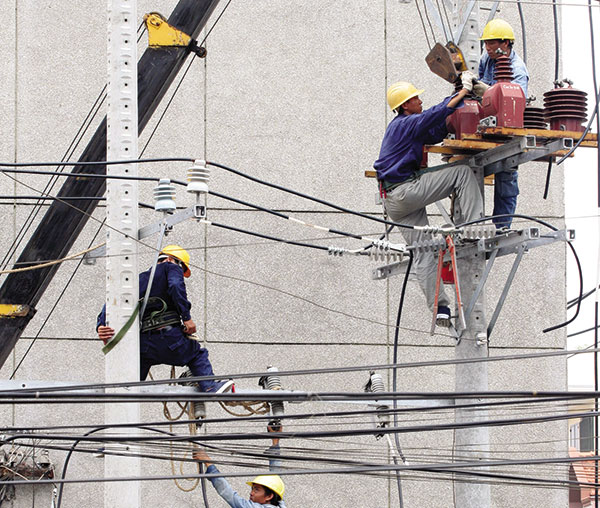Electricity sector gets BOT boost
 |
| A more stable power supply is in store as more foreign firms enter the power market via the BOT format Photo: Le Toan |
Last week, the operators of the Chinese-invested, 1,200-megawatt (MW) build-operate-transfer (BOT) Vinh Tan 1 thermal power project reported to Vietnam’s government that they will be finished 11 months ahead of schedule, as the $1.75 billion plant, located in the south-central province of Binh Thuan, is expected to start its first turbine in 2018 and the second in 2019.
Jointly invested by China Southern Power Grid, China Power International Holdings, and Vinacomin Power, the Vinh Tan 1 thermal power project is one in a lineup of key power projects in the government’s Power Development Master Plan VII, aimed at meeting Vietnam’s dramatically rising power demand during 2010-2020, with a vision toward 2030.
Vinh Tan 1 is the biggest power plant invested by a Chinese investor in Vietnam.
Tran Viet Ngai, chairman of the Vietnam Energy Association, said that the successful completion of the BOT power project is a positive development, and has once again raised hopes on boosting other power investments under the BOT approach.
The project also plays an important role in supplying power to some southern provinces, as there is concern over the power supply in said provinces due to delays in the Song Hau 1 and Long Phu 1 thermal power plants.
The Long Phu 1 and Song Hau 1 projects in the Mekong River Delta provinces of Soc Trang and Hau Giang, respectively, are designed to produce 1,200MW each annually, but are now years behind schedule. Both of them are invested by Vietnam’s state-run oil and gas group PetroVietnam.
The Vietnamese government has pressed ministries to boost coal-fired projects and coal supplies in order to sufficiently power the southern provinces in the near future. This is currently considered one of the main challenges the government faces.
Meanwhile, the Hai Duong BOT plant project spearheaded by Jaks Hai Duong Power Co., Ltd., a joint venture between Malaysian Jaks Resources Bhd and China Power Engineering Consulting Group Co., Ltd., expects to come into operation over the next few years since it started construction in March 2016. The first 600MW turbine of the 1,200MW plant is expected to be put into operation in 2020.
This is also the first foray of Malaysian firm Jaks Resources Bhd into Vietnam. Last week, company delegates also visited the southern province of Binh Phuoc to investigate opportunities for a 200MW solar project, with investment capital of $262.5 million.
Another Malaysian company, Janakuasa Sdn Bhd, has signed four landmark documents with Vietnam’s Ministry of Industry and Trade for the development of the 1,200MW Duyen Hai 2 coal-fired power plant in the southern province of Tra Vinh, specifically a land-lease deal, a power purchase agreement, a BOT contract, and a government guarantee.
The project is one of four power projects within the Duyen Hai Power Centre, which has a combined generation capacity of 4,348MW, and uses imported coal as the feedstock to generate power.
A few months ago, a consortium including Saudi Arabian ACWA Power and Korea’s Taekwang Power Holdings Co., Ltd. officially received an investment certificate for the $2.3 billion Nam Dinh 1 thermal power project, making it the seventh foreign-invested BOT power project licensed in Vietnam. The project is scheduled to commence construction in early 2018. The first unit will enter commercial operations within 51 months.
The list of foreign-invested BOT power projects will rise further as several foreign firms are currently in negotiations or are conducting feasibility studies for developing thermal power plants nationwide. They include Korea’s Samsung C&T Corporation, India’s Tata Power, Singapore’s Sembcorp Industries, and Thailand’s EGATI.
What the stars mean:
★ Poor ★ ★ Promising ★★★ Good ★★★★ Very good ★★★★★ Exceptional
Latest News
More News
- Hermes joins Long Thanh cargo terminal development (February 04, 2026 | 15:59)
- SCG enhances production and distribution in Vietnam (February 04, 2026 | 08:00)
- UNIVACCO strengthens Asia expansion with Vietnam facility (February 03, 2026 | 08:00)
- Cai Mep Ha Port project wins approval with $1.95bn investment (February 02, 2026 | 16:17)
- Repositioning Vietnam in Asia’s manufacturing race (February 02, 2026 | 16:00)
- Manufacturing growth remains solid in early 2026 (February 02, 2026 | 15:28)
- Navigating venture capital trends across the continent (February 02, 2026 | 14:00)
- Motivations to achieve high growth (February 02, 2026 | 11:00)
- Capacity and regulations among British areas of expertise in IFCs (February 02, 2026 | 09:09)
- Transition underway in German investment across Vietnam (February 02, 2026 | 08:00)
















 Mobile Version
Mobile Version